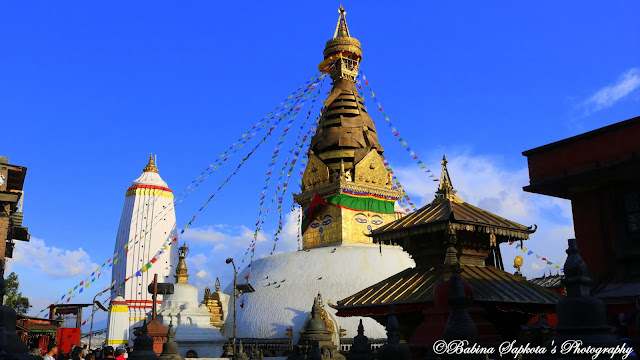Kirtipur Ashoka Stupa or Chilancho Vihar (Jagat Pal Maha Vihar)
This
monastery is situated on the eastern side of Kirtipur. In Newar language, the word Chilan means
immortal and the word Cho means Hill. Therefore, its
literal meaning is the immortal god situated on the hill. The stupa is
about 9.0-10.5 high on a quadrangular base. On all four sides there are
small chaityas. The dome is plastered white.
The
local people call this monastery as Chilancho Baha: but it is
described as Jagatpal Maha Vihar in the historical records. The
people of Patan and Kathmandu call this monastery as Kyapu: Baha:. It was
turned into a monastery in 1515 by Jagatpal varma, who used to live
at Pim Bahal of Patan, and who was very powerful during the regime of
King Ratna Malla of Kathmandu. But the Chaitya is thought to have been built
by Samrat Ashok of India. According to the chronicle used by Daniel
Wright, who wrote the History of Nepal hundred years ago. When Samrat Ashok
came to Kathmandu, he established a Stupa also at Kirtipur. There is a house of
a guthi for Vajracharyas which is known as Agan-Chhen, the inner
sanctum or sacred room maintained by Buddhist Tantric worshippers and in which
there is a statue of Buddha. There are also some small Chaityas around the
monastery, which is situated on the top of the area.
The Vajracharyas, newar Priests,
live around this monastery. Archaeologists believe the Chaityas of this Vihar
to be different from the Chaityas of other places, and, in their view, they
possess greater importance from the archaeological point of view. People of
that place celebrate a festival realted with the Vihar on the night of Ashwin
Purnima, the full moon night of the month of September. In his Sketches
From Nepal, foreign scholar H.Ambrose Old Field has described
the Chaitya in this way:
"In
this south-eastern quarter of the city, there is a Buddhist Temple, called
Chillandeo, which, though comparatively small, yet on account of the number of
sculputered objects of Buddhist worship which it exhibits and the accuracy with
which the various deities and their respective symbols and vehicles are
figured, is one of the most perfect and valuable monuments of Buddhism in the
whole valley."
Near
the Chaitya, there are stone images of Khadga Vir and Vajra Vir, two elephants,
one Dharma Dhatu mandal of Nepal era 789 and the other big bell dated Nepal era
876. Aaround this Chaitya there are some deities – Vairochana, Achyovya,
Padmapani Lokeshwara, tara Devi-4, Ratna Sambhava Amitabha and Amogha
Siddhi.
The Article written above is cited from a blog by Promise Maharjan. This article was published on August of 2016 in his own blog. The link of the original article is given below. I cited this article on 5th August 2018.
https://memorableplace-kirtipur.blogspot.com/2016/08/kirtipur-ashoka-stupa-or-chilancho.html







it really helped me thank you soo much
ReplyDeleteThank You Babina Sapkota for mentioning my blog Kirtipur - A Memorable Place.
ReplyDeleteThis comment has been removed by the author.
ReplyDelete